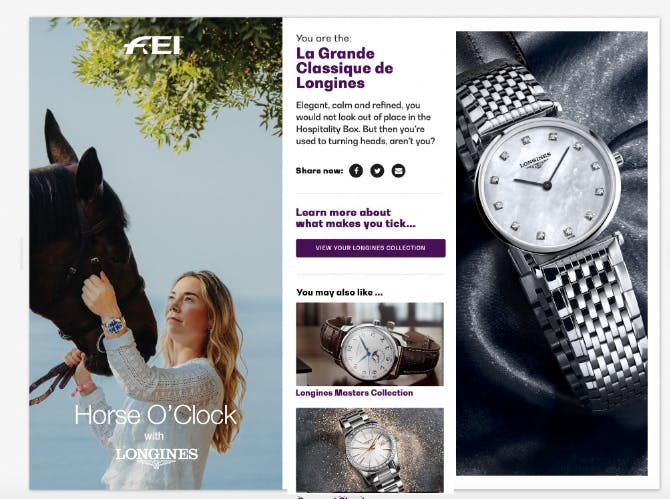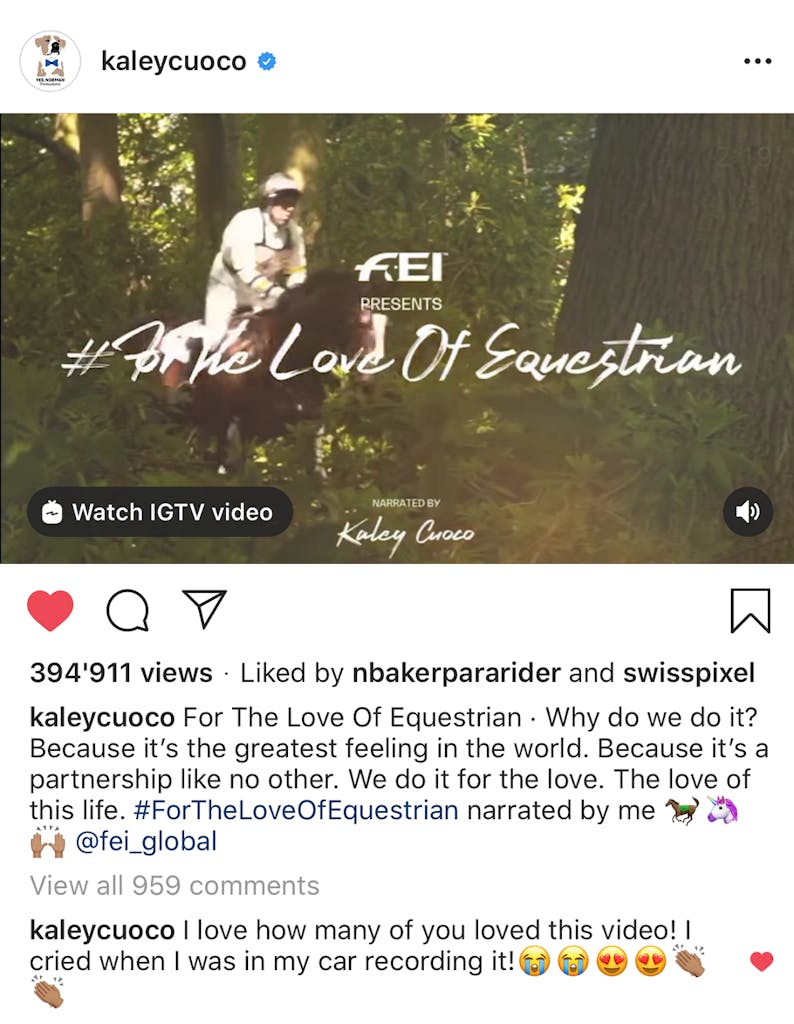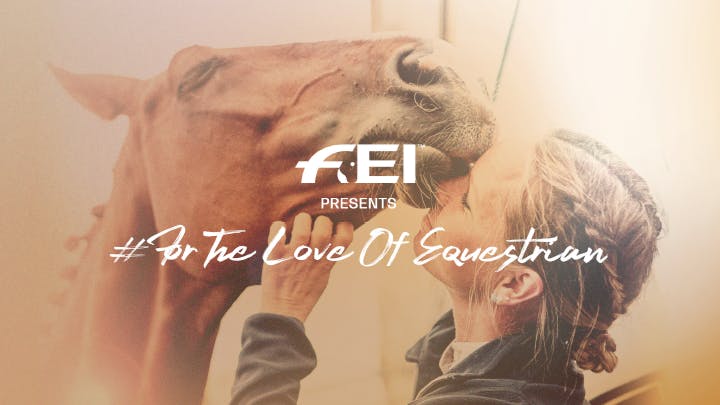The Fédération Equestre Internationale (FEI), like all sports organisations and governing bodies, is facing an unprecedented set of challenges due to the Covid-19 pandemic.
The cancellation of more than 700 international equestrian sports events around the world since March 2020 has translated into a drop in revenue of approximately €15m for the FEI.
In the absence of live events, organising committees across the world have seen a significant portion of their turnover – sourced from ticket sales, hospitality and trade stands – effectively dry up, while the FEI’s partners have lost the opportunity to receive exposure and build brand equity at competitions.
Easing pressures
Without the usual content to feed to FEI media rights licensees worldwide or FEI.TV, the federation’s OTT platform, the sport has had to look at new ways of engaging with its established fan base and expanding its reach.
“Our first duty has been to ensure human health and wellbeing, as well as maintaining the focus on horse welfare, and we’ve had to react quickly to help our community survive during this economically difficult time,” says FEI secretary general Sabrina Ibáñez.
“To ease some of the financial pressure on organisers, we have waived all calendar fees for events taking place between March 15, 2020 and the end of the year, and we’ve reduced annual subscriptions for our 137 national federations by 50 per cent for 2020.
“From an internal perspective, we put 60 per cent of our workforce on temporary partial unemployment as of April 15 and recruitment is currently on hold, except for two director-level appointments for jumping and endurance.
“In addition to the temporary partial unemployment of our HQ staff, we are taking all possible cost-saving measures to reduce our expenditure, including postponing all non-essential projects.”
Taskforces
On a sporting front, the FEI acted proactively to establish a series of discipline-specific taskforces to evaluate the overall impact on the FEI calendar, both of the Covid-19 pandemic and the resulting postponement of the Tokyo 2020 Olympic Games until 2021.
The taskforces have met virtually on a regular basis to decide key points related to the sporting calendar, as well as to create greater flexibility for date applications and modifications to help organisers to reschedule events.
With stakeholder communication a key aspect of its crisis management plan, the FEI moved swiftly to create a comprehensive Covid-19 section on its website with all of the latest news and resolutions, as well as the composition of all calendar taskforces, their scheduled meetings and their recommendations to the FEI Board. The section also includes an extensive list of frequently asked questions and answers in relation to Covid-19, which are updated regularly.
“We’ve done our best to keep the lines of communication open with all our stakeholders and we have taken every short-term measure we believe necessary, as well as looking further ahead into 2021,” Ibáñez adds.
“However, we still have no idea how long this will all last and what the impact will be in the long term. All we can be sure of right now is that this pandemic is destined to change the sporting landscape and we need to accept that we may have to permanently change the way we work and the way our sport is delivered and consumed.”
Reimagining events
While the pandemic has underscored the need for rapid decision-making and, as a prerequisite, a free flow of information, it also demands creative solutions to re-starting the live event experience.
“Some of these events have a long history and tradition and we’re exploring every avenue to engage the community, even if the event cannot take place or needs to take place behind closed doors,” Ibáñez says.
“Our first priority is to protect the health and welfare of our entire community, from the athletes to the fans and of course our officials, and we must do everything necessary to make competitions possible and above all safe in these challenging times as this virus continues to have an impact upon all our daily lives.”
The FEI is currently working in close collaboration with national federations, stakeholders, organisers and the World Health Organisation to ensure that all precautionary measures are put in place as the sport gets back up and running.
In May, the FEI Board mandated the FEI Medical Committee to work on a protocol for the safe resumption of international equestrian events. It requires the national federations and organisers to carry out a risk assessment to host safe competitions and put in place a set of recommended discipline-specific guidelines at all events, working in line with national and local restrictions.
Commercial partnerships
With live events paused and thus fewer opportunities for the FEI’s sponsors to build relationships with equestrian fans, the federation has been working closely with its commercial partners to create brand awareness.
“The sports world has never seen anything like this before, and understandably there has been a tendency to hold back on some activities that are perceived as business non-essentials,” says FEI commercial director Ralph Straus.
“But we felt there was a real opportunity to work closely with our commercial partners and come up with ideas that would keep the momentum going and offer other avenues for brand building and visibility.
“We realised we needed to reinvent some of the working practices we are so accustomed to, and so we held various sessions with our commercial partners to create unique initiatives that effectively build on our partnership objectives.”
One result has been the creation of #HorseOClock with Longines, the FEI’s Top Partner. This is a consumer engagement campaign run on the FEI’s digital channels where fans are able to answer equestrian-related questions to determine the watch that matches their personality.

“In these challenging times, we want to stay in touch with our fan base, especially within the equestrian community with whom we are strongly associated all around the world,” explains Longines vice-president of marketing Matthieu Baumgartner.
“Today our commitment is stronger than ever, even without competition being held. By joining forces with the FEI in the project #HorseOClock, we seize this opportunity to emphasise the close link between Longines and the equestrian world, between time and horse lovers, in other ways: by presenting our watches in a playful way!”
Other online fan activities include the Longines FEI Jumping Nations Cup™ series Quiz to replace the Fantasy Game, which could not be conducted due to the absence of live events this year. On every Monday until September, fans are given 10 multiple-choice questions to answer against the clock, with the fastest times earning points to climb up the leaderboard.
While these digital activations are a creative way of staying top-of-mind when on-site brand building activities are not possible, the FEI has also offered additional opportunities for visibility through its digital channels to each of its commercial partners.
“We felt it was important to give our sponsors the platform to highlight projects that reflect their wider company mission and values,” Straus explains.
“Our official apparel partner, Horse Pilot, for example, is currently producing washable masks made out of the textiles used to produce their clothing lines. It’s a non-sport-related project that conveys the company’s focus on social responsibility and means that they have been able to connect with our fan base in a meaningful way.”
Deeper fan content
Ironically, even though the sport has been on hold, the pandemic has precipitated the creation of different digital offerings as the FEI experiments with new forms of content.
“The equestrian world is not just a sport, but a lifestyle, and it is the horse which brings together our diverse fan base,” adds Straus. “This opens up a multitude of digital opportunities to keep entertaining our audience and engaging with them while there are no live events and people have been confined to their homes.
“The FEI had a great year of digital exposure in 2019 with over 220 million video views on the federation’s channels alone – a significant growth from the figure of four million in 2015. But we have witnessed a noteworthy increase in our digital numbers across all our channels over the last few months.”
Instagram takeovers, like the one hosted recently by Australian eventer Andrew Hoy, gave fans an insight into the day-to-day life of a triple Olympic gold medal-winner, resulting in more than 2.6 million impressions.
The FEI has also created unique campaigns like #ForTheLoveOfEquestrian, with the support of digital agency Redtorch, to encourage fans to take part in the content creation process. American actress and avid equestrian Kaley Cuoco is the voice of the FEI’s latest digital campaign.
“The #ForTheLoveOfEquestrian campaign is a celebration of our fans’ love of all things horse-related and the passion that underpins the equestrian sport lifestyle,” Straus explains.
“It invites everyone from elite to amateur and leisure riders to share their incredible stories. It brings our community together under a clear and positive campaign that does not focus on the medals, prize money and victories, but on the unique bond we have with the horse and our dedication to the sport.
“The video, which was also featured on Kaley Cuoco’s own channels, garnered close to a million views over the first weekend after the launch. It just goes to show that a strong and meaningful campaign can make a big impact on our work, even during a difficult time like this.”
Media initiatives
In 2017, the federation created the ‘FEI Media Stables’ – a central production house overseeing the planning and creation of all content, its channel management and performance measurement.
Working in close coordination with FEI broadcast partners such as IMG and the European Broadcasting Union, the FEI was able to create new forms of content, including features focusing exclusively on the horse and the stories around these wonderful creatures.
The current situation has given the FEI and its broadcast partners the space to broaden their relationships.
“While we’ve made FEI.TV free to subscribers and non-subscribers since mid-April, we have also been committed to supporting our broadcast partners by making our archives available to them, free of charge,” Straus says. “Opening our library of moving images to our partners, has resulted in new content features including a new original series called Icons.”
Icons is a six-part series that looks back at the careers of some of the most successful and influential equestrian athletes of recent years.Each 26-minute episode focuses on a specific athlete and the moments that defined their career and cemented their names in the history books. The series is intended to immerse the equestrian audience in some of the most exciting moments of equestrian action from past FEI championships and series.
“If we want to survive and return to thrive as a federation and as a sport, it is clear that we need to embrace the changing reality created by Covid-19,” says Straus. “Now, more than ever, it is time for all of us in the industry to look for the silver linings, capitalise on them and push ourselves to innovate more.”
